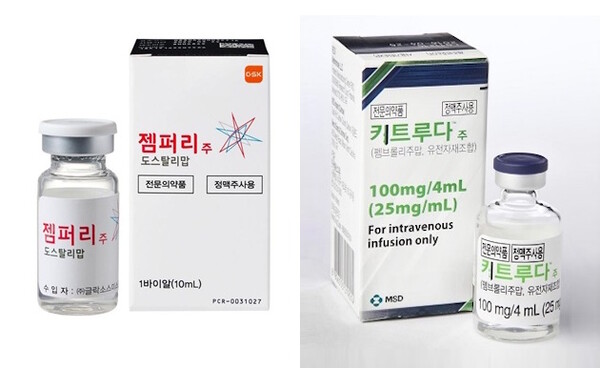GSK's anti-PD-1 immunotherapy drug Jemperli (dostarlimab) has overtaken MSD's Keytruda (pembrolizumab) in the first-line treatment market for advanced endometrial cancer, securing reimbursement approval ahead of its rival in a dramatic reversal.
While the Health Insurance Review and Assessment Service (HIRA) dragged out its review of expanding Keytruda's coverage for over two years, Jemperli capitalized on the situation, securing coverage for both first- and second-line endometrial cancer treatments.

According to the “Revised Notice on Drugs Prescribed and Administered to Cancer Patients” announced by HIRA on Thursday, the combination therapy of Jemperli + paclitaxel + carboplatin will be covered for the first-line treatment of patients with advanced or recurrent endometrial cancer who are mismatch repair deficient (dMMR)/microsatellite instability-high (MSI-H) starting Oct. 1.
This marks Jemperli's entry into the first-line reimbursement market, approximately two years after its initial reimbursement listing in December 2023 for the second-line or later treatment of dMMR/MSI-H patients.
Jemperli received its first domestic approval in December 2022 for the treatment of endometrial cancer in the second-line setting. In March 2024, its indication was expanded to include first-line treatment for patients with dMMR/MSI-H. In December of the same year, the indication was further broadened to include all-comer patients for first-line treatment.
In comparison, Keytruda received its initial approval in May 2020 for the treatment of endometrial cancer as a second-line or later therapy in combination with lenvatinib for patients without MSI-H or dMMR. In August of the same year, its indication was expanded to include second-line or later treatment as a monotherapy for dMMR/MSI-H patients. In August 2024, its indication was further expanded to include first-line treatment for all-comer patients.
In all aspects—timing of indication approval for endometrial cancer and the size of the target patient population—Keytruda held a more advantageous position compared to Jemperli.
However, the situation changed in June 2023 when MSD Korea applied for a blanket reimbursement expansion for Keytruda's 13 indications. The reimbursement review for Keytruda, which carries significant financial implications, was delayed for over two years. This delay pushed back the reimbursement application for endometrial cancer, along with the other requested indications, indefinitely.
To the relief of MSD Korea, the HIRA's Pharmaceutical Reimbursement Evaluation Committee (PREC) reviewed and approved 11 of Keytruda's indications this month. However, the drug still faces price negotiations with the National Health Insurance Service and requires approval from the Ministry of Health and Welfare's Health Insurance Policy Deliberation Committee (HIPDC). Consequently, actual reimbursement is expected only by the end of this year or early next year.
Furthermore, the endometrial cancer indications for Keytruda that passed the PREC this time are limited to “monotherapy” for second-line or later treatment and combination therapy with lenvatinib. Plans to apply for reimbursement expansion for first-line treatment remain distant.
In the meantime, Jemperli has swiftly captured both the first- and second-line reimbursement markets, effectively gaining a windfall benefit by overturning the market landscape.
Meanwhile, this amendment removed regulations concerning certain testing methods from Jemperli's reimbursement criteria.
Initially, Jemperli's reimbursement criteria stipulated that “dMMR” must be confirmed via immunohistochemistry (IHC) testing, and that “MSI-H” required additional polymerase chain reaction (PCR) or next-generation sequencing (NGS) testing if IHC results were inconclusive. These provisions have now been entirely removed.
Consequently, while the core criteria defining the patient population—the dMMR/MSI-H condition—remain unchanged, the mandatory requirement specifying which specific testing method must be used has been eliminated.
Ultimately, this deletion of provisions is interpreted as an institutional adjustment aimed at enhancing flexibility in the clinical setting and improving patient benefits, alongside the establishment of reimbursement for Jemperli as a first-line treatment.
Related articles
- Can immuno-oncology revolutionize endometrial cancer treatment in Korea?
- GSK Korea expands indication for Jemperli in endometrial cancer treatment
- Tepmetko, Jemperli, and Neulasta pass cancer review panel to move closer to reimbursement
- Will FDA-designated endometrial cancer drug Jemperli become an innovative new drug in Korea?
- HIRA calls for insurance overhaul to ensure access to high-cost orphan drugs
- Insurance coverage for GSK's Jemperli expanded to 1st-line endometrial cancer in Korea
- Imfinzi’s bid for coverage faces Keytruda’s double-edged impact in Korea

